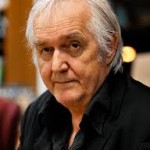Henning Mankell, The Man Who Smiled
£70.00
£63.00
10% off!
The Kurt Wallander police detective stories by Henning Mankell is one of the most liked series of recent years. Wallander is the detective with heart and soul. The character of Wallander has a special quality, and we become acquainted with his personal problems – his health condition is almost a metaphor for the state of modern Sweden. In this novel the author is haunted by the murder in 1986 of Sweden’s prime minister, Olof Palme. This incident was a major factor is loosening belief in the basis of modern institutions, particularly in the authority of social democracy. This sense of doubt and gloom pervades the novel. This Scorpion edition of “The Man Who Smiled” contains a nice appreciation by Diamond Dagger winner John Harvey.
In Stock: 3 available

 Some of the most trenchant social reality novels have come from the Swede Henning Mankell. The deserved winner of the CWA Gold Dagger with Sidetracked, it was a turning-point in the reception of Scandinavian crime with both readers and publishers in the Anglo-Saxon world. As a consequence a good deal more European crime fiction was translated into English. Inevitably, “Wallander is one of the great creations of modern crime fiction” said Barry Forshaw, and further “overweight, diabetes-ridden and with all the problems of modern society leaving scars on his soul”. He made it to the TV screens with Kenneth Branagh in the lead; but not before the books had been highly successful in a home-grown Swedish series. Mankell is married to Eva Bergman, daughter of legendary Swedish film maker Ingmar Bergman.
Some of the most trenchant social reality novels have come from the Swede Henning Mankell. The deserved winner of the CWA Gold Dagger with Sidetracked, it was a turning-point in the reception of Scandinavian crime with both readers and publishers in the Anglo-Saxon world. As a consequence a good deal more European crime fiction was translated into English. Inevitably, “Wallander is one of the great creations of modern crime fiction” said Barry Forshaw, and further “overweight, diabetes-ridden and with all the problems of modern society leaving scars on his soul”. He made it to the TV screens with Kenneth Branagh in the lead; but not before the books had been highly successful in a home-grown Swedish series. Mankell is married to Eva Bergman, daughter of legendary Swedish film maker Ingmar Bergman.
What makes Mankell’s books interesting though is his taught writing and dry Scandinavian perspective. Wallander is a homicide detective in a smaller Swedish town, Ystad, and continually comes up against the problems that plague larger cities. Often a small crime will reveal something like international drug gangs or human trafficking. The character of Wallander has a special quality, at work he has the bit between his teeth and wont let go. Then we become acquainted with his personal problems – his health condition is almost a metaphor for the state of modern Sweden. But above all his fans will him on. Enjoy.
Plotline: A disillusioned Inspector Kurt Wallander is thrown back into the fray when he becomes both hunter and hunted in this adventure from the pen of Sweden’s master of crime and mystery. Crestfallen, dejected and spiralling into an alcohol-fuelled depression after killing a man in the line of duty, Inspector Kurt Wallander has made up his mind to quit the police force for good. When an old acquaintance, a solicitor, seeks Wallander’s help to investigate the suspicious circumstances in which his father has died, Kurt doesn’t want to know. But when the solicitor also turns up dead, shot three times, Wallander realises that he was wrong not to listen. Against his better judgement, he returns to work to head what may now have become a double murder case. A rookie female detective has joined the force is his absence, and he adopts the role of mentor to her as they fight to unravel the mystery. An enigmatic big-business tycoon, who hides behind an entourage of brusque secretaries and tight security, seems to be the common denominator in the two deaths. But while Wallander is on the trail of the killer, somebody is on the trail of Wallander, and closing in fast.
In this novel the author is haunted by the murder in 1986 of Sweden’s prime minister, Olof Palme. This incident was a major factor is loosening belief in the basis of modern institutions, particularly in the authority of social democracy. This sense of doubt and gloom pervades the novel. The Man Who Smiled was issued in 2005 in a run of 80 signed and numbered copies in a special binding. It was a delight to have John Harvey accept our invitation to write the appreciation of the author. John recalls in his piece that he suggested that Mankell would win with Sidetracked at the Crime Writers’ award ceremony; this is because Mankell was one of a select group of writers that John followed. Mankell’s book did indeed win and the result was that he brought ‘crime in a cold climate’ to the forefront.
is loosening belief in the basis of modern institutions, particularly in the authority of social democracy. This sense of doubt and gloom pervades the novel. The Man Who Smiled was issued in 2005 in a run of 80 signed and numbered copies in a special binding. It was a delight to have John Harvey accept our invitation to write the appreciation of the author. John recalls in his piece that he suggested that Mankell would win with Sidetracked at the Crime Writers’ award ceremony; this is because Mankell was one of a select group of writers that John followed. Mankell’s book did indeed win and the result was that he brought ‘crime in a cold climate’ to the forefront.

 Anthology: No Alibi (edited by Maxim Jakobowski) – 29 signatures
Anthology: No Alibi (edited by Maxim Jakobowski) – 29 signatures
 Len Deighton, Hope
Len Deighton, Hope

Rating by The London Guardian on June 23, 2012 :
The London Guardian
When Henning Mankell, the most famous Swedish writer since Strindberg, published the first Kurt Wallander mystery 14 years ago, he could not have imagined how successful they would be. In Sweden the series triumphed overnight; worldwide it has sold in excess of 20 million copies. British readers were slow to catch up.
The Man Who Smiled is the fourth Kurt Wallander book, originally published in Sweden in 1994. It opens with a road accident in thick fog in which a solicitor crashes his car and dies. ‘The scene of the accident,’ we are told, ‘was unusually desolate even for Skane (on the southernmost tip of Sweden, where the country runs out, Skane is a sort of Baltic Texas).
The man’s son questions the accident theory, and wants Wallander to investigate. Within days, the son too is dead – shot three times. A double murder? Wallander thinks so. Now approaching 50, the inspector is on anti-depressants and increasingly alcoholic. He is tempted by a spell in a health spa, but prefers to drink more whisky and talk of his – and Sweden’s – demise.
Though The Man Who Smiled has its jocose moments, the novel appears to be distinctly Scandinavian in its gloom. Earlier in his police career, we learn, Wallander had accidentally shot a man dead in the dense Skane mist. Often he wonders if he should be a cop at all, but stoically pushes on with his investigations. As the story unfolds he uncovers evidence of high-level financial corruption and transplant organ-smuggling. The novel’s supporting cast of shambolic squad members, with their failing eyesight and cars that break down when they need them, adds to the general despondency.
Questions of responsibility and morality, of justice and democracy are explicitly raised, which is unusual in detective fiction. Mankell believes passionately in ‘solidarity’ (as he calls it) among people, and his murder mysteries are an expression of that belief. The Sweden of The Man Who Smiled is a country whose time has passed; behind the roseate flush of its social-democratic prosperity lies a deepening corruption where justice may not prevail.
Wallander’s anger at the state of his country lends this book an old-fashioned moral force and sense of disquiet. ‘What used to be considered a crime 10 years ago is now judged a non-crime’, the detective observes morosely.
But in his gruff way, Wallander is a lovable gumshoe, and his investigations into the Skane double killing have a mordant comedy of their own. (‘Murder and explosions are certainly unpleasant things’, he declares.)
In spite of its occasional black humour, The Man Who Smiled is haunted by the murder in 1986 of Sweden’s prime minister, Olof Palme. The failure of the authorities to find Palme’s killer created, Mankell says, a ‘dangerous scepticism’ about the Swedish justice system and state institutions. Most of the guilty characters are brought to book, but ‘the dishonesty that seems to be common nowadays in society’ will, one suspects, win out. Wallander, a sternly pensive slogger who eats junk food, is one of the most credible creations in contemporary crime fiction, and The Man Who Smiled is vintage Nordic storytelling.
Rating by The Boston Globe on June 23, 2012 :
The Boston Globe
As Kurt Wallander ponders the murder he’s faced with in “The Man Who Smiled,” he wonders: “There’s a why and a who, but there may well be something else.”
That “something else” is what sets Henning Mankell apart from most other crime writers. Others specialize in finding just the right motive for why Harry slew Sally and still others hew closer to the Agatha Christie whodunnit mould, but Mankell is unparalleled for that “something else” — the ineffable atmospherics of mystery writing.
“The Man Who Smiled” is not really the latest in the Wallander series, just the latest of the Swedish writer’s to be published in the United States. Published in 1994, it completes the cycle of Wallander novels (a collection of past short stories is due out in the fall), bringing American readers fully up to date with the dour detective.
Here he’s even dourer than usual, having killed a man in the previous novel, “The White Lioness.” In this, the fourth in the series, we pick up with Wallander a year after he took sick leave to recuperate from the killing. His shame at that certainly separates him from most other fictional sleuths and lets the new reader know right away he isn’t in Philip Marlowe land.
Mankell makes that obvious in more literary ways as well. No one creates murderous moods as well as he does. Take the opening sentences: “Fog. A silent, stealthy beast of prey. Even though I have lived all my life in Skane, where fog is forever closing in and shutting off the world, I’ll never get used to it.”
The doomed driver of the car in the opening chapter has more to worry about than fog, though, and his son soon lures Wallander out of his self-imposed exile. This is the novel that introduced the woman on Wallander’s team, Ann-Britt Hoglund, which turns out to be one of the more interesting features of the book.
Unfortunately, that’s not a compliment. It would be rewarding to report that “The Man Who Smiled” is a lost classic in the series, but perhaps its tardiness in seeing the light of American day is not wholly accidental.
As the plot unfolds, the question becomes: Is the super-rich captain of industry who’s moved into the Ystad neighborhood responsible for the murder, as Wallander suspects? If so, could he possibly be as clumsy in covering it up? Our lips are sealed, of course, but these aren’t the kinds of questions we usually ask ourselves in Wallander mysteries. Those are more deep-rooted queries in terms of the evil that men (and the occasional woman) do, both individually and as members of a new amoral world order.
In “The Man Who Smiled,” Mankell seems more interested in scoring political points. It’s a must for Wallander completists, of whom I certainly count myself, but it’s not the one to get started on. (Mankell came out of the box with one of his best, “Faceless Killers,” so there’s no reason to begin anywhere else.)
There’s also the kind of Hollywood heroics at the end that Mankell doesn’t often resort to for his aging detective. It’s always a treat to spend time with Wallander, and with Mankell’s writing. He’s given us high expectations, and they aren’t quite met in “The Man Who Smiled.”